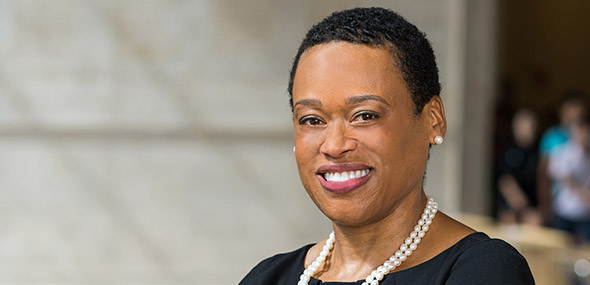COMPUTING AND AI: HUMANISTIC PERSPECTIVES FROM MIT
Foreword | Melissa Nobles
MIT Chancellor, 2021—; Kenan Sahin Dean, MIT School of Humanities, Arts, and Social Sciences, 2015-2021

"The advent of artificial intelligence presents our species with an historic opportunity — disguised as an existential challenge: Can we stay human in the age of AI? In fact, can we grow in humanity, can we shape a more humane, more just, and sustainable world?"
— Melissa Nobles, Professor of Political Science
Kenan Sahin Dean, MIT School of Humanities, Arts, and Social Sciences, 2015-2021; MIT Chancellor, 2021-
Series | Computing and AI: Humanistic Perspectives from MIT | Published September 2019
The advent of artificial intelligence presents our species with an historic opportunity — disguised as an existential challenge: Can we stay human in the age of AI? In fact, can we grow in humanity, can we shape a more humane, more just, and sustainable world? I am cautiously optimistic that the answer will be yes because after several centuries of the ongoing industrial-technical revolution, we are reaching a new stage of maturity.
As AI and other advanced technologies become ubiquitous in their influence and impact, touching nearly every aspect of life, we have increasingly seen the need to more consciously align powerful new technologies with core human values — integrating consideration of societal and ethical implications of new technologies into the earliest stages of their development. Asking, for example, of every new technology and tool: Who will benefit? What are the potential ecological and social costs? Will the new technology amplify or diminish human accomplishments in the realms of justice, democracy, and personal privacy?
At the same time, we see an opportunity for advanced technologies to help solve a host of stubborn political, economic, and social issues that trouble today’s world by integrating technology with a humanistic analysis of complex civilizational issues— among them climate change, the future of work, and poverty — issues that will yield only to collaborative problem-solving.
It is not too much to say that human survival may rest on our ability to solve these problems via collective intelligence, using approaches that call on the whole range of human knowledge. To advance approaches to such collaborative problem-solving and research, the contributors to this series, representing each of the humanistic fields in MIT’s School of Humanities, Arts, and Social Sciences, have responded to two questions:
What domain knowledge, perspectives, and methods from your field should be integrated into the new MIT Schwarzman College of Computing, and why?
What are some of the meaningful opportunities that advanced computing makes possible in your field?
Together, the responses to these two questions offer a guidebook to the myriad, productive ways that technical, humanistic, and scientific fields can join forces at MIT, and elsewhere, to further human and planetary well-being. The commentaries are fascinating to read, simply as a tour of knowledge domains, but our hope, of course, is that they will prove immensely practical as well.
MIT’s vision for our new college — as a global center equipped to help ensure that advanced technology brings changes "for the good of all" as President Reif puts it — is a recognition of the urgency of this moment in human and planetary history. We approach this work knowing that the stakes are high, and that we are most likely to succeed by calling on innovation and creativity; on talented people from every part of the world; on persistence, optimism, and a judicious humility. In other words, by staying human.
Suggested links
Series | Computing and AI: Humanistic Perspectives from MIT
Melissa Nobles website | About / Publications
Letter regarding update on the MIT Schwarzman College of Computing
Preliminary reports examine options for MIT Schwarzman College of Computing
SCC working groups identify key ideas for new college
3 Questions: The social implications and responsibilities of computing
Report from the SCC working group focused on ethical and societal questions
Series prepared by MIT SHASS Communications
Office of the Dean
MIT School of Humanities, Arts, and Social Sciences
Series Editor and Designer: Emily Hiestand, Communication Director
Series Co-Editor: Kathryn O'Neill, Associate News Manager
Published 23 September 2019